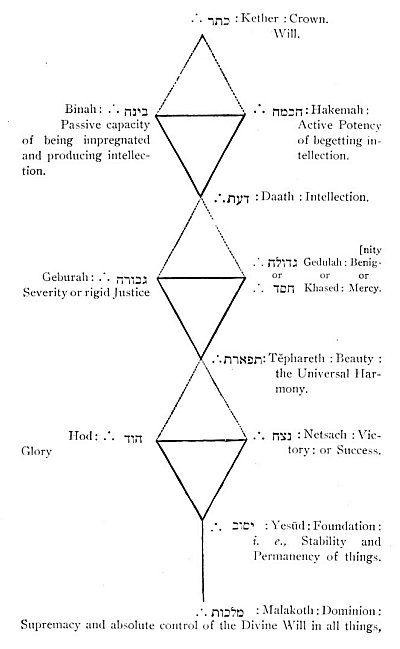The Egyptians used as a Sign of their God Canobus, a![]() or a
or a![]() indifferently. The Vaishnavas of India have also the same Sacred Tau, which they also mark with Crosses, thus
indifferently. The Vaishnavas of India have also the same Sacred Tau, which they also mark with Crosses, thus![]() , and with triangles, thus,
, and with triangles, thus,![]() . The vestments of the priests of Horns were covered with these Crosses
. The vestments of the priests of Horns were covered with these Crosses![]() . So was the dress of the Lama of Thibet. The Sectarian marks of the Jains are
. So was the dress of the Lama of Thibet. The Sectarian marks of the Jains are![]() The distinctive badge of the Sect of Xac Japonicus is
The distinctive badge of the Sect of Xac Japonicus is . It is the Sign of Fo, identical with the Cross of Christ.
. It is the Sign of Fo, identical with the Cross of Christ.
On the ruins of Mandore, in India, among other mystic emblems, are the mystic triangle, and the interlaced triangle,![]() , This is also found on ancient coins and medals, excavated from the ruins of Oojein and other ancient cities of India.
, This is also found on ancient coins and medals, excavated from the ruins of Oojein and other ancient cities of India.
You entered here amid gloom and into shadow, and are clad in the apparel of sorrow. Lament, with us, the sad condition of the Human race, in this vale of tears! the calamities of men and the agonies of nations! the darkness of the bewildered soul, oppressed by doubt and apprehension!
There is no human soul that is not sad at times. There is no thoughtful soul that does not at times despair. There is perhaps none, of all that think at all of anything beyond the needs and interests of the body, that is not at times startled and terrified by the awful questions which, feeling as though it were a guilty thing for doing so, it whispers to itself in its inmost depths. Some Demon seems to torture it with doubts, and to crush it with despair, asking whether, after all, it is certain that its convictions are true, and its faith well founded: whether it is indeed sure that a God of Infinite Love and Beneficence rules the Universe, or only some great remorseless Fate and iron Necessity, hid in impenetrable gloom, and to which men and their sufferings and sorrows, their hopes and joys, their ambitions and deeds, are of no more interest or importance than the motes that dance in the sunshine; or a
p. 293
[paragraph continues] Being that amuses Himself with the incredible vanity and folly, the writhings and contortions of the insignificant insects that compose Humanity, and idly imagine that they resemble the Omnipotent. “What are we,” the Tempter asks, “but puppets in a show-box? O Omnipotent destiny, pull our strings gently! Dance us mercifully off our miserable little stage!”
“Is it not,” the Demon whispers, “merely the inordinate vanity of man that causes him now to pretend to himself that he is like unto God in intellect, sympathies and passions, as it was that which, at the beginning, made him believe that he was, in his bodily shape and organs, the very image of the Deity? Is not his God merely his own shadow, projected in gigantic outlines upon the clouds? Does he not create for himself a God out of himself, by merely adding indefinite extension to his own faculties, powers, and passions?”
“Who,” the Voice that will not be always silent whispers, “has ever thoroughly satisfied himself with his own arguments in respect to his own nature? Who ever demonstrated to himself, with a conclusiveness that elevated the belief to certainty, that he was an immortal spirit, dwelling only temporarily in the house and envelope of the body, and to live on forever after that shall have decayed? Who ever has demonstrated or ever can demonstrate that the intellect of Man differs from that of the wiser animals, otherwise than in degree? Who has ever done more than to utter nonsense and incoherencies in regard to the difference between the instincts of the dog and the reason of Man? The horse, the dog, the elephant, are as conscious of their identity as we are. They think, dream, remember, argue with themselves, devise, plan, and reason. What is the intellect and intelligence of the man but the intellect of the animal in a higher degree or larger quantity?” In the real explanation of a single thought of a dog, all metaphysics will be condensed.

Moe is the founder of GnosticWarrior.com. He is a father, husband, author, martial arts black belt, and an expert in Gnosticism, the occult, and esotericism.





